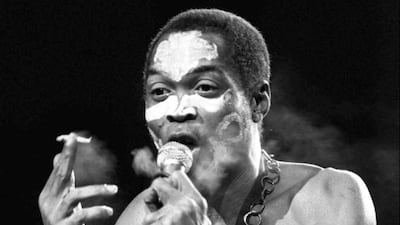At the height of his career, the musician and activist Fela Anikulapo Kuti (1938-97) was considered the best-known African after Nelson Mandela. The Nigerian singer never outpaced the late South African leader in popularity, but Alex Gibney’s new film, Finding Fela!, which premiered at the Sundance Film Festival this week, brings his biography to a world audience.
The documentary mixes archival images from the singer’s youth to his death, clips from Fela!, the hit Broadway musical that he inspired and interviews (not all of them admiring) with Kuti and those who knew him. The hybrid style reflects Gibney’s assessment of the performer who told audiences that “music is the weapons of the future”.
“Now it’s the future,” the director says, “so it’s back to the future. We’re definitely catching up with someone who was way ahead of his time.
“He represented an extraordinary mixture of art and politics – he could celebrate humanity and also be a wild and crazy and flawed and magnificent person and have such an enormous impact. We’re used to political figures being cartoon stick figures. This guy was anything but that.
“He celebrated humanity in all its messiness and yet a million people showed up for his funeral,” says Gibney, who won the Academy Award for Best Documentary for Taxi to the Dark Side (2007), about US interrogation abuses in Afghanistan.
Given Kuti’s popularity, much of his career was filmed. The son of a prominent family, he left Nigeria to study medicine in London, but turned to music, emulating the jazz of Miles Davis. Kuti also admired American pop legends such as the singer James Brown, mixing Brown’s flamboyant style with African rhythms in songs that would extend for more than 20 minutes. Costumed dancers with painted faces rivalled anything in Brown’s shows. Kuti’s political songs made him more than an entertainer.
Finding Fela! operates along parallel lines. We see Nigeria emerge from colonialism and collapse into civil war in the 1960s. The economy of Africa’s most populous country was sustained by petroleum, which Kuti saw as more of a curse than a blessing. The footage – some of it never shown before – ranges from grainy newsreel and still photos to what look like home movies of war and violence, including close-ups of Kuti’s own bruised and lacerated body after trips to jail.
The documentary cuts away from those images to another dramatic narrative record of those times, album covers for Kuti’s recordings by the Lagos artist Lemi Ghariokwu Abiodun. Like Kuti’s songs, his album art could be incendiary.
Kuti’s recordings reflect a similar dramatic range. We hear him assimilating influences as he crafts his own populist sound, with lyrics satirising Nigerian politics during the last three decades of his life. Like the film’s visual textures, the throbbing soundtrack of Finding Fela! reflects a refinement of technology from crude performance recordings to sophisticated production.
Another narrative line is the creation of the Broadway musical, Fela!, by the African-American choreographer Bill T Jones. Gibney’s documentary was originally planned as a chronicle of a trip by Jones and his theatre team to Africa to search for Kuti’s roots.
“Along the way, it became a film about finding Fela,” he says. “The journey took us deeper and deeper and got more confusing for a long time. The film changed shape a lot.”
Not a reverential portrait, Gibney’s documentary shows Kuti as impulsive and wildly headstrong. In 1978, in the spirit of what the singer called Africanism, he married 27 women in his entourage. He would later die of complications from HIV-Aids, which he never made public.
Gibney, who shows masses mourning at the singer’s funeral, expects that Kuti’s erratic private life will weigh on any debate over his legacy. So will the fact that no single singer or composer or political activist fills his shoes today.
As the band from Fela! played at a post-premiere celebration, complete with dancers, Kuti’s musical legacy seemed strong as ever. “He made a difference,” Gibney says. “He was a voice for the voiceless.”
artslife@thenational.ae

